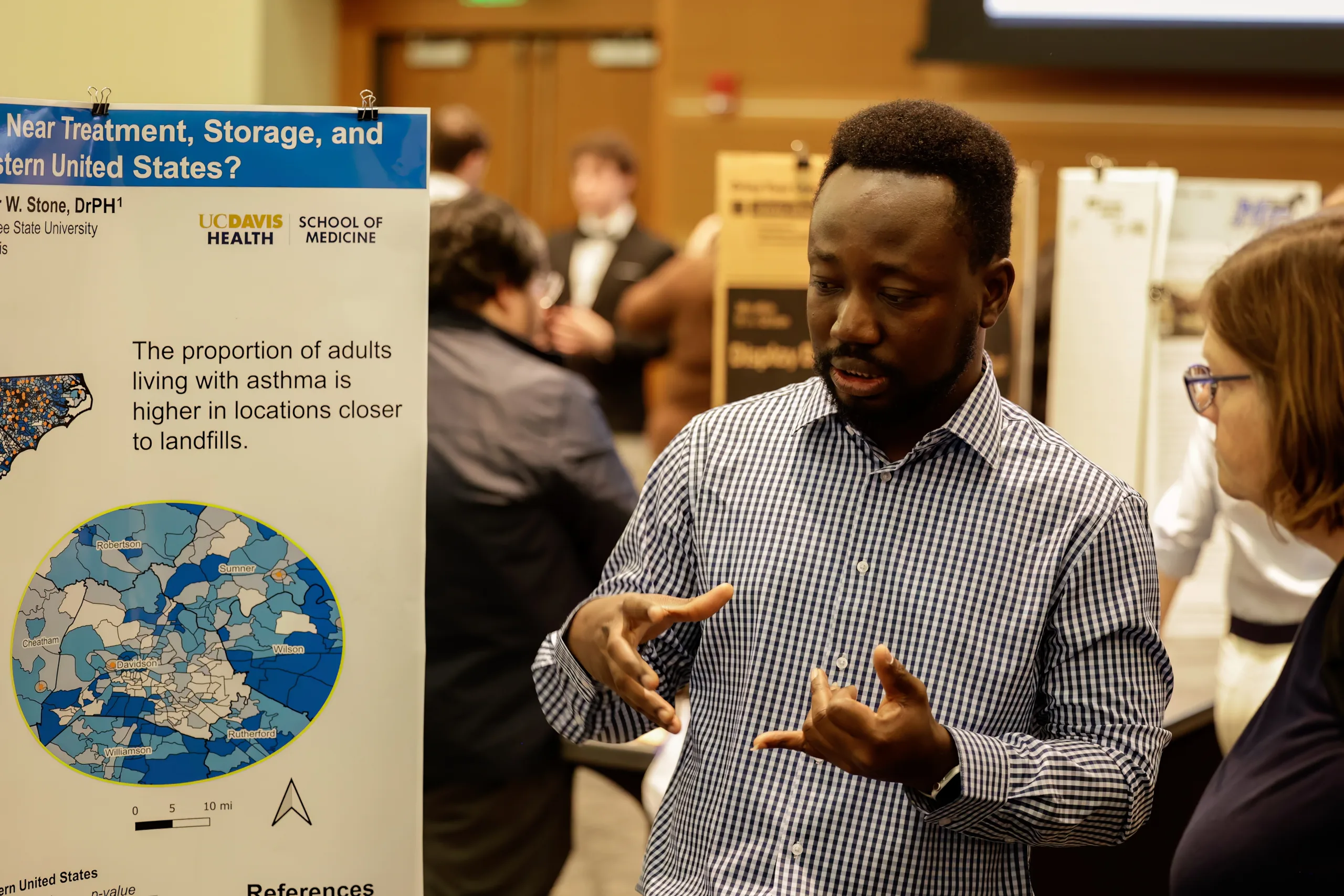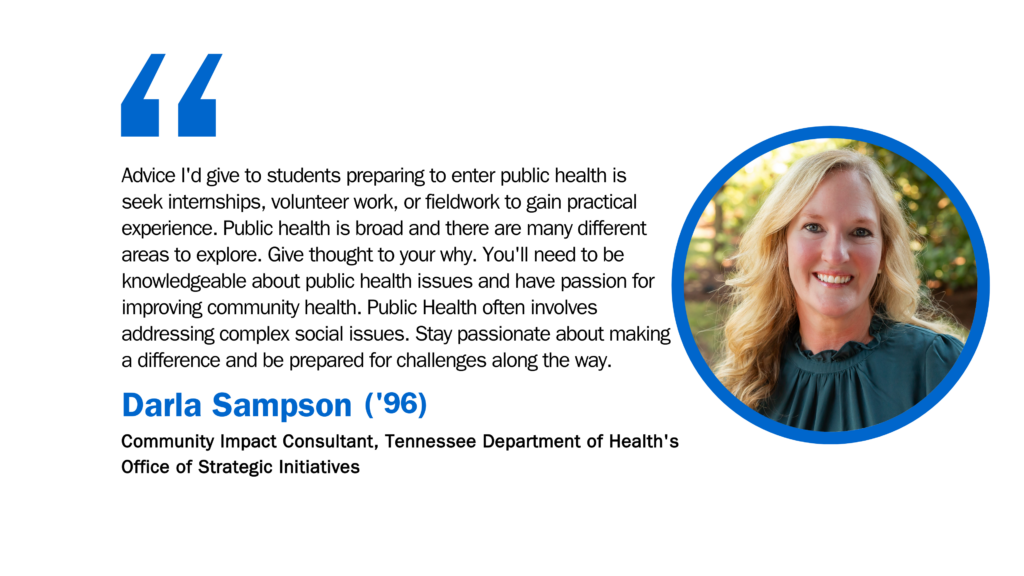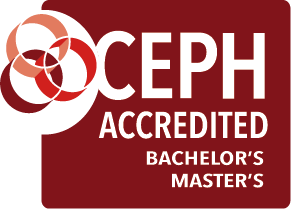
Public Health
Take a leadership role in Public Health with the two-year Master of Public Health program. Learn more today.
Public Health, Community Health Concentration, M.P.H.
The Community Health concentration in the Master of Public Health program offered by the College of Behavioral and Health Sciences at MTSU offers preparation for a wide range of roles and settings within the public health arena. These settings include non-governmental and governmental agencies at international, national, state, and local levels. The Master of Public Health degree is a two-year program through the Department of Health and Human Performance.
This option offers students an invaluable breadth of public health-related knowledge, training, and skill set needed to optimize career opportunities at the local, state, regional, national, and global levels. The program, via in-built flexibility, accommodates both traditional and non-traditional students while ensuring that all graduates demonstrate the core competencies of public health. Students typically enroll in the program from a variety of backgrounds and may choose the thesis or non-thesis track. However, all students, regardless of track, must complete 6 hours of Applied Practical Experience (APE).
Middle Tennessee State University’s (MTSU) Master of Public Health (MPH) program is accredited by the Council on Education for Public Health (CEPH); the nationally recognized accrediting body for public health (https://ceph.org/).
You may request a copy of the program’s CEPH Accreditation Report and the Final Self-Study Report by sending a request to public.health@mtsu.edu.
If you live in one of these states: KY; you may be able to attend MTSU at in-state rates under the Academic Common Market program.
News Briefs

MTSU Public Health ‘PHamily Dinner’ celebrates career achievements of alumni
Over 60 Middle Tennessee State University Public Health Program alumni and students attended the second annual “PHamily Dinner Reception” and awards ceremony held Oct. 9 at the MT Center on campus.[ Read More ]

Public health graduate students sweep CBHS awards at MTSU’s annual research expo
Research conducted by graduate students in MTSU’s Public Health program within the Department of Health and Human Performance swept the top prizes at the university’s annual research and creative activity “Scholars Week” event in the graduate-level College of Behavioral and Health Sciences category. Public health students presented 10 projects total at the event, consistent with [ Read More ]
News Briefs

MTSU Public Health ‘PHamily Dinner’ celebrates career achievements of alumni
Over 60 Middle Tennessee State University Public Health Program alumni and students attended the second annual “PHamily Dinner Reception” and awards ceremony held Oct. 9 at the MT Center on campus.[ Read More ]

Public health graduate students sweep CBHS awards at MTSU’s annual research expo
Research conducted by graduate students in MTSU’s Public Health program within the Department of Health and Human Performance swept the top prizes at the university’s annual research and creative activity “Scholars Week” event in the graduate-level College of Behavioral and Health Sciences category. Public health students presented 10 projects total at the event, consistent with [ Read More ]
Related Media

Public Health, Community Health Concentration, M.P.H.
Employer List
Alumni Success


Middle Tennessee State University (MTSU) prepared me for my career path by equipping me with foundational skills, professional development opportunities, and direct experience that translated seamlessly into my roles.
-Jocelyn Rajkowski, Class of '24, Community Health Associate at UF Health Care Connect St. John
MTSU played a pivotal role in preparing me for my career path by providing a strong foundation in public health principles and practical skills. Through my coursework and hands-on experiences, I gained expertise in data collection, program implementation, and health education
-Maimoonah Dabshee, Class of '23, Population Health Analyst at Helen Ross McNabb Center
Internship Opportunities
What is the MPH Internship?
While pursuing a Master of Public Health (MPH) at MTSU, you have an opportunity to take what you have learned in the classroom and put it into action. The Council on Education for Public Health (CEPH) requires all MPH students to gain hands-on experience in the field, which is why MTSU's MPH program includes a six-credit Applied Practical Experience (APE), also known as the internship.
During this internship, you'll work in a community-based public health setting that aligns with your career goals, where you'll apply the knowledge and skills you've gained throughout your studies. You'll be guided by two key figures: the Internship Coordinator, who provides overall support, and an Agency Preceptor (your site supervisor), who helps you navigate the real-world public health challenges that align with your career interests. This internship is your chance to gain valuable, practical experience that not only boosts your resume but also helps you develop skills that will set you apart in the public health field.
Previous Internship Sites Include:
- Mother’s Milk Bank of Tennessee
- MTSU Center for Health and Human Services
- Rutherford County Health Department
- Rutherford Prevention Coalition for Success
- South-Central Regional Health Department
- Tennessee Department of Education, Coordinated School Health
- Tennessee Department of Health, COVID Cluster Program
- Tennessee Department of Health, Healthcare Associated Infections and Antimicrobial Resistance Program
- Tennessee Department of Health, Foodborne Illness Program
- Tennessee Department of Health, Zoonotic and Waterborne Disease Program
- Wilson County Health Department
Tennessee Department of Health Internship
Many students in the Master of Public Health program choose to complete their Applied Practical Experience with the Tennessee Department of Health. The Tennessee Department of Health offers paid internships during the fall, spring, and summer terms at local and regional health departments.
- Tennessee Department of Health Internships
- MTSU Applied Practical Experience and Integrative Learning Experience Student Handbook
- Public Health Employment Connection
Helpful Links

MTSU’s Career Development Center
MTSU offers a comprehensive Career Development Center that serves students throughout the full student experience and beyond. They collaborate with faculty and staff to equip students with the tools to be marketable to the world of work and continuing education.
Students can schedule an appointment or check online resources and job boards at mtsu.edu/career.
Students can find current internship opportunities by talking to faculty and visiting the University job and internship board called Handshake.
Wondering what you can do with your major? Check out our What Can I Do with A Major In guides.



Application Due Dates
Summer Entry:
- Priority Deadline: January 20
- Applications submitted by this date will be given priority.
- Summer Rolling Admissions Deadline: April 15
- Applications submitted by this date will be considered on a rolling basis if space remains.
Fall Entry:
- Priority Deadline: January 20
- Applications submitted by this date will be given priority.
- Fall Rolling Admissions Deadline: June 20
- Applications submitted by this date will be reviewed on a rolling basis if space remains.
Spring Entry:
- Priority Deadline: September 20
- Applications submitted by this date will be given priority.
- Spring Rolling Admissions Deadline: November 20
- Applications submitted by this date will be reviewed on a rolling basis if space remains.
Note: Admission decisions are typically sent out 2 to 3 weeks after the application deadline.
International Applicants: Please allow an additional 2 to 3 months after acceptance into the MPH program to complete immigration requirements for an I-20 and secure a visa interview date in your home country.
Student Testimonies


 “I was initially captivated by public health because I wanted to make a positive impact on a community scale, rather than achieving change one by one through individual interventions. Through my time in the MPH program, I was equipped with the tools necessary to see health through a population lens and thus identify solutions through population level interventions. Since graduating, I have had the opportunity to manage CDC federal grants, evaluate state level grants, and administer local grant funds within Middle Tennessee addressing a variety of public health topics. I am passionate about seeing healthy equity be achieved right here in Middle Tennessee, and the skills I obtained from my MPH have enabled me to make large strides in the right direction.”
“I was initially captivated by public health because I wanted to make a positive impact on a community scale, rather than achieving change one by one through individual interventions. Through my time in the MPH program, I was equipped with the tools necessary to see health through a population lens and thus identify solutions through population level interventions. Since graduating, I have had the opportunity to manage CDC federal grants, evaluate state level grants, and administer local grant funds within Middle Tennessee addressing a variety of public health topics. I am passionate about seeing healthy equity be achieved right here in Middle Tennessee, and the skills I obtained from my MPH have enabled me to make large strides in the right direction.”
Additional Links

CONTACT US













